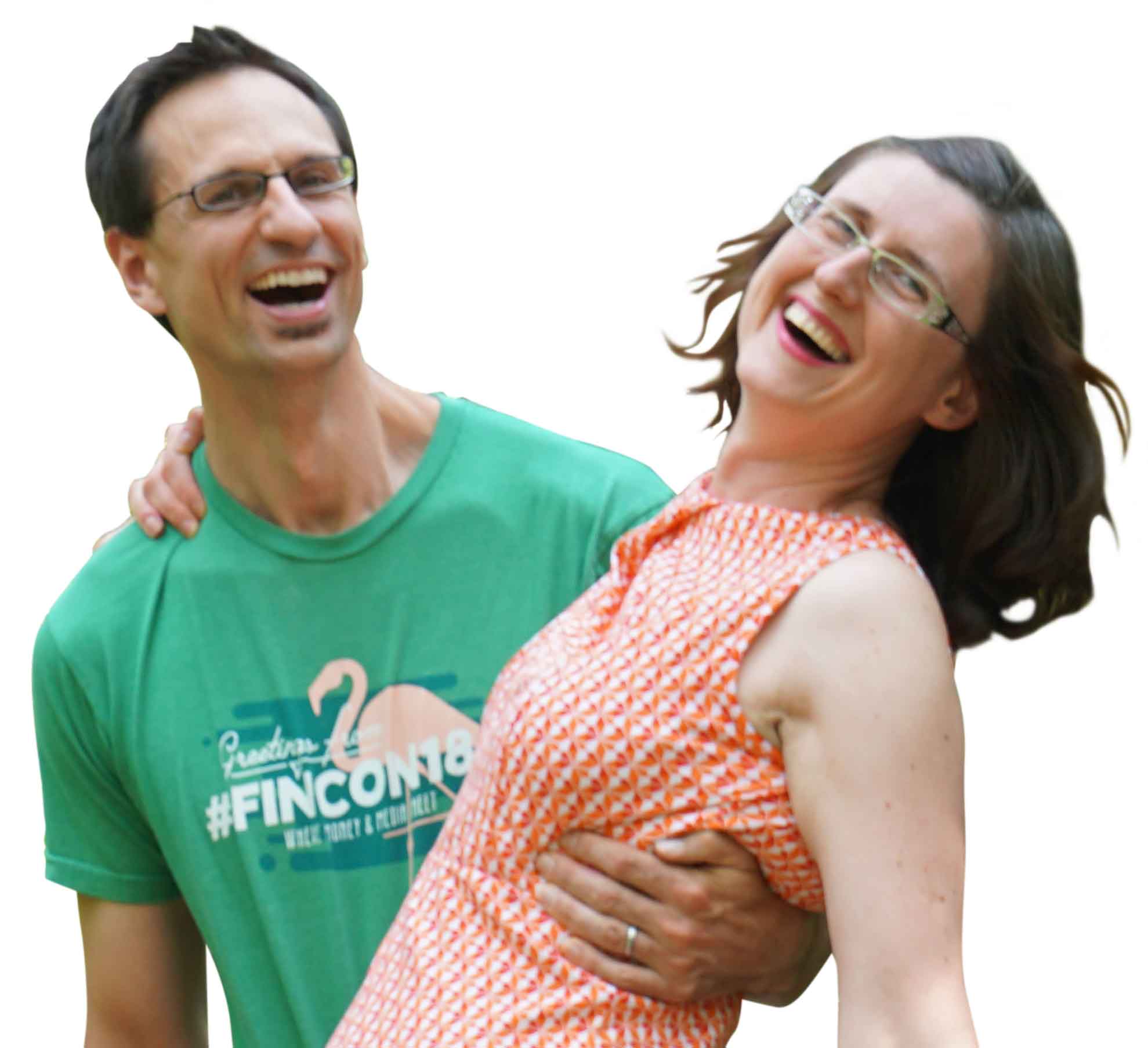I’ve got some shocking news:
Other people have lives.
They’re trying to get through the never-ending lists of daily chores and obligations, and squeeze in time for the things that make them happy.
How much time do you think they spend thinking about the house you live in, or the car you drive?
All of their time! They’re obsessed with you…
OK, maybe not.
“You wouldn’t worry so much about what others think of you if you realized how seldom they do.” – Olin Miller
Yet so many of us try to impress others by buying the latest and greatest material status symbols.
But often, we just end up with our net worth flashing a big negative sign.
AHEAD OF THE CURVE, OR FALLING BEHIND?
Before Mark and I got married, we participated in an “Engaged Encounter” day – basically, marriage prep through the Church with other soon-to-be newlyweds.
As the day ended and we were leaving the parking lot in a lineup of cars, Mark looked around thoughtfully and said, “We’re so far ahead of the curve.”
It blew my mind earlier that day that several engaged couples had never discussed having kids – and then found out they weren’t on the same page! So I assumed Mark meant that open and honest communication would give us a head start.
To be sure, I asked, “What do you mean?”
Mark responded in a way I didn’t expect.
He said, “Look at all these new cars. Their average price is $30,000. These nice couples are starting out their lives together in debt. It will be really hard to recover from that. We’re light years ahead.”
I thought, “That makes a lot of sense.”
And it really did.
Over time, Mark and I deepened our philosophy of chasing less stuff and more joyful experiences.
We drove older cars when we could have bought a new Lexus with cash, and rented a small condo even when we could have bought a million dollar house.
So were we crazy? Were we just being cheap?
WHAT IS BEING CHEAP?
To me, being cheap is selling future years of our lives through debt – and having to pay for the obligations our younger self signed us up for.
Debt can limit our possibilities – such as retiring early, changing careers, or pursuing our passions – and thus cheapen our future life experiences.
Debt is like the “Korn” tattoo we got at 19 – it doesn’t seem so cool at 45!
Yet nearly all of us slog through life carrying the burden of debt and bills. The load gets a little heavier every time we think, “No problem. Just put it on the credit card!”
We pick up this burden before we even say “I do” – and most of us carry it into our grave. That’s right: the relationship with debt lasts longer than most marriages.
A whopping 73% of us are dying in debt. Think about that: that’s over half a century of financial stress!
So what’s really being cheap?
Fully exhausting the utility of things we own before buying a “newer” model? Or trading the most valuable and irreplaceable thing we have – our time – for mass-produced objects?
Driving a well-functioning used car and right-sizing a house? Or being forced to work a certain kind of job to pay our debts, long after we’ve become sick of it?
Our choices carry a price measured in more than dollars: the real cost is not reaching our true potential.
When our financial runway is two paychecks long, our freedom in life shrinks. We’re less able to pursue the things that give us meaning, and to change direction in life. This can even limit our personal growth.
And it doesn’t have to be this way.
Even with unexceptional incomes, extraordinary freedom is possible.
NOT CARING WHAT OTHERS THINK
I learned the hard way that chasing the approval of others is a dead end.
I was going after the prestige of a Ph.D. diploma even though it made me miserable, and was afraid to quit because others may view me as a “failure”. Instead, I gave up a part of my twenties – what should have been some of the best years of my life.
I told myself, “Never again”.
That doesn’t mean I don’t care at all what people think of me – that would make me a sociopath. It’s just that I no longer let others’ opinions drive my decisions.
And I’m genuinely unconcerned with what people think of my possessions – because I don’t identify with them. My car is not me. My phone is not me. The brand name on my clothes is not me.
I would argue that none of us are defined by our possessions. Our deepest needs – such as love, joy, belonging, and self-expression – sit outside the realm of material objects.
When our personal philosophy is strong, we’re able to politely listen to well-meaning advice from others, sincerely thank them – and listen to ourselves.
Here are several real comments Mark and I have heard:
“Why don’t you spend any money on yourself?”
Instead of consumer products, we chose to buy freedom in life. Money is a tool that helps us live life on our terms – spend time with our kids and do what we love with NO financial stress. In fact, we think it’s kind of fun to talk about money! Yes, we’re a little sick.
“When are you gonna buy a house? You’re just throwing money away on rent.”
Mark and I rented a small condo for over five years at $370 each, including some utilities, pool and gym. We even got some extra cash flow by renting out the basement for a couple of years. Instead of doing maintenance and repairs, we travelled extensively, pursued our interests and built friendships – while socking money away. We finally bought a nice house when our first child was born – with no bank involved.
“Mark, you’re so cheap dude. Why don’t you buy an engagement ring?”
When Mark and I were getting engaged, I didn’t want an engagement ring. He asked three times just to be sure, but I was deeply convinced that a shiny rock would bring me no joy. The ring didn’t matter to me personally and I didn’t see it as a reflection of my worth or Mark’s love. So we would have spent thousands of dollars on an object for the sole purpose of me showing it off to friends. Mark and I chose to spend a month in Europe instead – and still treasure those enriching experiences. And no one thought we were crazy when they found out we chose the trip – they genuinely thought it was a great idea!
IMPACT OF BEING TRUE TO OURSELVES
Not caring what others think has worked out well for our happiness and financial freedom. But what impact has it had on other aspects of our lives?
- Friendships: Positive. Friends have opened up about their financial situations and asked for help and advice, leading to deeper relationships.
- Careers: Positive. Not being concerned about losing our jobs helped us take risks that paid off. Mark was able to create his own position to do what he enjoys, and I was able to step out of a full time gig to pursue engaging projects and spend time with kids.
- What strangers think of us: Irrelevant. Again, chances are they have lives and couldn’t care less about my 13 year old Honda.
- Opportunities in life: Positive. No opportunities were closed to us because of an absence of status symbols. In fact, we’ve been able to use our financial runway as a springboard to jumpstart our dreams. And we could always join a country club if we really wanted (barf!)
THE FINAL HURDLE
OK, so you may buy into this – but here’s the final hurdle. Many of us wouldn’t openly admit we’re pursuing status. Instead, we say we like “nice” things – and it’s definitely not about what others think, but ourselves.
I’m calling bullshit.
Research has consistently shown that greatest fulfillment comes from actively participating in life: creating, building, connecting and helping.
When we see that new SUV ad on TV that promises to give us “freedom” – the reality is that it will make us into indentured servants to lenders.
And even our pleasure is likely to be short lived because the experience is so passive. Car designers imagined the design, engineers made the production drawings, manufacturing plant workers built the car, advertisers created an ad campaign to appeal to our emotions, and dealers sold us the car.
What did we contribute? Oh yeah – years of our lives through debt!
And here’s the final test: If you were the last person on Earth, with no one else around, would you still care about the brand logo on your car?
What do you think? Do the opinions of others hold us back from greater freedom in life? Let us know in the comments!
Check out our “Values to Freedom” Worksheet to help you become financially free by living your highest values.



